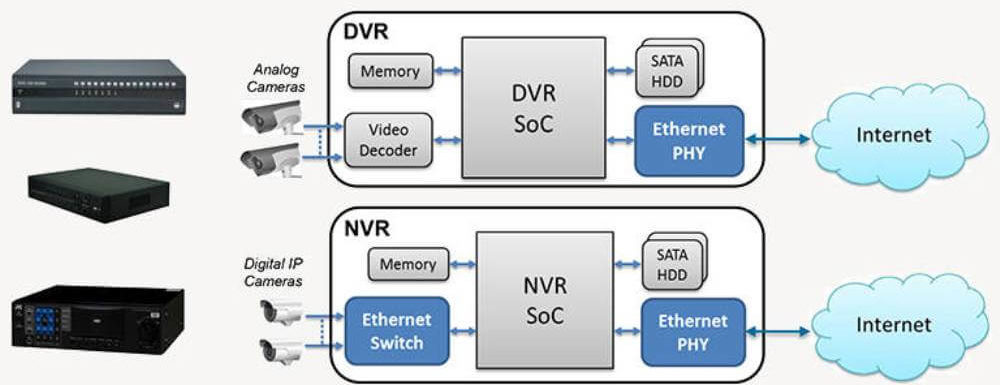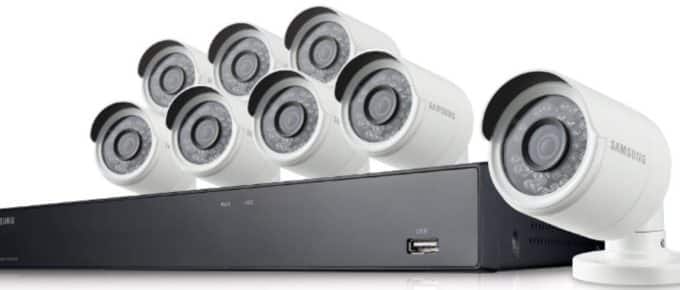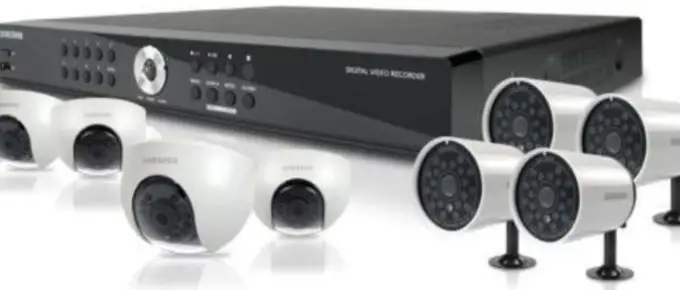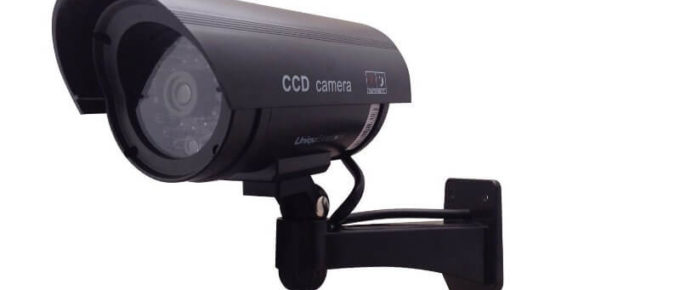A CCTV camera installed in your home can protect you from house break-ins, thefts, and burglaries. Burglars and vandals tend to avoid the houses fitted with Security Cameras or Surveillance Systems.Before investing in a CCTV Camera, you should know that they can be of two types, i.e. NVR and DVR systems.Let us now try and understand the basic working of these cameras and the differences between the two in order to take an informed decision about which one to buy. Both NVR and DVR are used for the purpose of recording and storing videos and have their own advantages.
What Is A NVR Security System?
Quick Navigation
Network Video Recorder (NVR) records videos directly from the network via Ethernet cables. It makes use of Internet Protocol Cameras (IP Cameras). It saves encoded videos at IP Cameras which can be later accessed anywhere on the network. Encoding means transforming digital video files present in one format to another.
It does make use of any pre-determined video processing hardware. The cameras come programmed with IP addresses connected to the network. That is why the footage from any of the IP Cameras can be viewed independently without the help of the recorder. You can have the best NVR system in the market under your budget.
The best of the best NVR sytem in the market is GW Security 4K NVR Security System
What Are Its Types?
There are two types of NVR’s:
PoE NVR’s – PoE (Power over Ethernet) NVR’s function via a single Ethernet cable that provides power and networking to all cameras. They operate based on a PoE switch.They come with Ethernet ports attached to PoE cameras. Get the best PoE switch for your NVR device.
WiFi NVR’s – WiFi NVR’s come with IP Cameras that function wirelessly without the presence of any camera ports. You will need a good Wi-Fi NVR supported POE injector to connect.
What Is A DVR Security System?
Digital Video Recorder (DVR) comes installed with a small chip inside which processes the videos sent to it by analog cameras. It transforms analog videos into digital formats.
In a DVR system, the part of encoding is performed at the DVR itself and not at individual cameras. Hence, the cameras need not be programmed with the recorder.
The best of the best DVR sytem in the market is SMONET DVR Security System
Diffrences Between NVR And DVR Security Systems?
Let us understand the differences between both the systems through a simple table:
| Points Of Difference | NVR System | DVR System |
|---|---|---|
| Cameras | IP Cameras | Analog Cameras |
| Transmission Cabling | Cat 5 or Cat 6 Ethernet cables | Coaxial Cables |
| Signal | Digital | Analog |
| Resolution | Higher 4K(8MP) or 1920p(5 MP) or 1440p(4 MP) | Lower 1080p(2 MP) or 720 (1 MP) |
| Placement | Anywhere on Network subject to extension | Only near the power source (cannot exceed 300 ft from DVR system) |
| Installation | Easy setup, Less cabling and Wiring, No point-to-point connection, Thin Ethernet Cables | Difficult setup, More wiring and cables, Requires point-to-point connection, Large coaxial cables |
| Camera Cost | Higher | Lower |
| Wiring System | Wireless or uses single Ethernet Cable | Power and audio/video cables are required |
| Bandwidth | More Bandwidth | Less Bandwidth |
| Accessibility | Remote Viewing | Viewing Only At Recorder |
| Signal Stability | More stable | Less stable |
| Budget | More Expensive | Less Expensive |
| Video Quality | More detailed | Less detailed |
1. Cameras And Cabling
NVR uses Cat 5 or Cat 6 Ethernet cables for signal transmission. IP Cameras in an NVR send out digital signals processed by an encoder that comes with an onboard web server. If you’re looking for a DVR security camera, choose the best option in the market.
DVR uses coaxial cables for transmission for signal transmission. The analog cameras send out analog signals to DVR for processing.
2. Resolution
IP Cameras in an NVR system has more superior resolution than DVR’s analog cameras. IP Cameras offer resolutions ranging from 2 MP to 12 MP.
DVR’s analog cameras cannot match up to such high resolution. Their resolution only touches 1 MP or 2 MP.
The difference in resolution between the two systems makes the image and video quality of an NVR superior to that of a DVR.
3. Placement
The placement process for an NVR is very easy and flexible. You can be installing it anywhere on the network since it functions based on network connectivity.
Due to the versatile nature of an NVR, you can place it even in a faraway place like the closet, attic and the garage. Long distance is not a problem for an NVR and you can extend the wiring using a PoE switch.
On the other hand, DVR systems are not so flexible in nature and can only work near the power source. Their extension is limited to 300 feet distance after which their image quality decreases.
4. Installation
An NVR is easy to set up and to configure. Since it comes in either wireless or single cable forms, it uses less wiring and space. IP cameras do not require to be attached to the recorder directly and can be set up anywhere on the network.
A DVR is cumbersome to install as it requires multiple wires for producing audio and video signals. Multiple wires require multiple drilling holes and these wires end up occupying for space.
Coaxial Cables used in a DVR system are thicker in diameter and size as compared to Ethernet cables. Hence, installing them in tight spaces becomes a hassle. The thickness of coaxial cables also causes signal loss.
5. Accessibility
Remote viewing is possible in an NVR system since it works independently of the recorder. Data is processed at each individual camera rather than at the recorder itself as in the case of a DVR.
The footage in a DVR system can be only viewed at the recorder since the processing takes place only at the recorder. The individual camera viewing option is not available in a DVR system.
6. Costs
The high-end technology, easy installation and wireless facility of an NVR system make it more expensive to purchase in the market.
A DVR system is lesser priced in the market and is more affordable
How To Choose Between The Two Systems?
In order to make the right choice, one should measure the pros and cons of each system.
Given below are the pros and cons of using an NVR system:
Pros
- Covers long distances
- Very Flexible
- Easily setup
- High resolution
- Simple to use
- Greater accessibility of cameras
- Less wiring
Cons
- Expensice
- Dependent on Internet connection
Given below is a list of the pros and cons of using a DVR system:
Pros
- More affordable
- Less Bandwidth for limited use
- Not dependent on the Internet
- Reliable Signals
Cons
- Cannot cover long distances
- Low resolution
- Difficult setup
- More wiring
- Cameras not easily accessible
- High maintenance costs
Based on the above analysis, NVR systems any day fare better than a DVR system. But choosing between the two depends upon your budget and convenience.
If you require a high form of security or surveillance, it is better to opt for an NVR system. If you are not very tech savvy, then the better option is an NVR system as it is more user-friendly and easy to install.
A DVR system is more affordable than an NVR since it is priced at lower rates in the market. But it is cumbersome to install and offers fewer features than an NVR. If your property is already comes fitted with coaxial wires, then it more advisable to opt for a DVR system.
Additional Factors To Consider
There are some additional factors you need to check when you purchase either of the two systems. The following factors which will help you do a background check of both DVR and NVR systems:
- Find out about the processor and the number of channels it can accommodate. Go for a powerful processor if you require more channels
- Storing capacity of an NVR is up to 2 TB which can be further expanded based on your requirement.
- If you want higher resolution, then search for 5MP cameras in NVR and 1080p in the case of DVR.
- Most NVR’s provide 4 to 8 cameras with a facility to add more cameras. Go for cameras that provide clear visibility even in darkness.
- Check for IP Cameras that are resistant to all weather conditions.
- Go for a DVR Camera with a good frame rate for better resolution
- Select a DVR Camera fitted with Infrared LED lights for night vision
- DVR Cameras usually have storage capacity up to 2 TB and higher with a facility for up gradation.
- Opt for the compression feature in a DVR system for storing more data
- Look for Cloud storage in a DVR that makes recovering data possible even after damage
- Look for plug and play facility in a DVR system
- Look for HD-CVI or HD-SDI cameras in a DVR system
Best Brands Available In The Market
The Best Brands available in the market that manufacture NVR and DVR systems are Amcrest, Canavis, Swann, Hikvision, Sony, Dahua, Q-See, Lorex, Defender, and Uniden. You can choose from any of these brands while purchasing your surveillance systems since these companies are reputed, reliable and produce good quality security cameras.









Leave a Reply